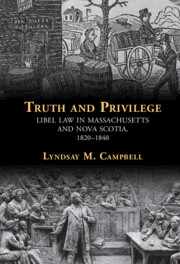Book contents
- Truth and Privilege
- Studies in Legal History
- Truth and Privilege
- Copyright page
- Contents
- Tables
- Foreword – The Osgoode Society for Canadian Legal History
- Acknowledgments
- 1 Introduction
- 2 The Common Law’s Diverging Paths
- 3 The Transformation of Privilege
- 4 Truth, Privacy and Authority
- 5 The Individual Conscience and Blasphemous and Obscene Expression
- 6 Private Defamation Suits
- 7 Conclusion
- Book part
- Bibliography
- Index
- Publications of the Osgoode Society for Canadian Legal History
2 - The Common Law’s Diverging Paths
Published online by Cambridge University Press: 16 December 2021
- Truth and Privilege
- Studies in Legal History
- Truth and Privilege
- Copyright page
- Contents
- Tables
- Foreword – The Osgoode Society for Canadian Legal History
- Acknowledgments
- 1 Introduction
- 2 The Common Law’s Diverging Paths
- 3 The Transformation of Privilege
- 4 Truth, Privacy and Authority
- 5 The Individual Conscience and Blasphemous and Obscene Expression
- 6 Private Defamation Suits
- 7 Conclusion
- Book part
- Bibliography
- Index
- Publications of the Osgoode Society for Canadian Legal History
Summary
Chapter 2 describes the divergence between 1790 and 1830 of British and American thought on privilege and truth and describes the emergence of the common-law offense of publishing an obscene libel. The legal questions central to Burdett v. Abbot (King’s Bench, 1811) about the extent to which the British common law courts could consider parliamentary law are discussed. In Massachusetts the Supreme Judicial Court in Coffin v. Coffin in 1808 had much less constitutional difficulty constraining legislative privilege. Much more challenging in Massachusetts was the role of evidence of truth in a libel trial, after it had come in the 1790s to be understood as an appropriate defense for a republican citizen, criticism being necessary to the functioning of a republic. Evidence of truth became admissible in an ever-growing set of circumstances in which the public needed to be informed.
Keywords
Information
- Type
- Chapter
- Information
- Truth and PrivilegeLibel Law in Massachusetts and Nova Scotia, 1820-1840, pp. 32 - 81Publisher: Cambridge University PressPrint publication year: 2021
